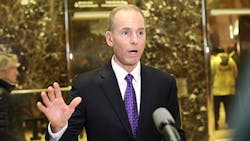For Boeing Chief and Trump Access, How Cozy Is Too Cozy?
Few companies have been as successful as Boeing Co. in building a cozy relationship with President Donald Trump. The question is, How close is too close?
The company found itself in an awkward position this week after reports that CEO Dennis Muilenburg had listened in on a phone call last month between Trump and the Air Force general managing purchases of Lockheed Martin Corp.’s F-35 fighter jets. The president has repeatedly criticized the plane for its high costs while suggesting Boeing’s F/A-18 Super Hornet might be a cheaper alternative.
The call, in Trump’s New York office, appeared to catch Muilenburg off guard, and details of how it came about remain scarce. Yet the unusual situation, raising questions of the integrity of the government bidding process, highlights the perils executives face in trying to navigate Trump’s unorthodox style. By listening in, Muilenburg potentially could have heard information “related to Lockheed that may not otherwise be available to Boeing,” said George Brenkert, a professor of business ethics at Georgetown University.
In such a scenario, Muilenburg may need to simply walk out of the room, said Brenkert, who called it an ethical “test situation.”
Representatives of Boeing and Lockheed declined to comment. Coincidentally, Boeing is set to host Trump on Friday for the rollout of its 787-10 Dreamliner at a South Carolina factory.
Lieutenant General Chris Bogdan, who was on the other end of Trump’s call, on Thursday defended the discussion. After a hearing before a House subcommittee, Bogdan said there was nothing “inappropriate” about Boeing’s involvement because “the things I talked about in front of Mr. Muilenburg were clearly publicly releasable information.” The Jan. 17 call was primarily to discuss F-35 affordability, the capabilities of the jet relative to Boeing’s F/A-18 Super Hornet and the Air Force One program, Bogdan said.
Since the election, Trump has sought to capitalize on his master negotiator image to both criticize and praise individual companies for actions they take affecting American workers. At times he has called out manufacturers for shipping jobs overseas, praised automakers for building in the U.S. and even slammed retailer Nordstrom Inc. for dropping his daughter Ivanka’s brand.
Boeing was one of those targets. In December, Trump lamented the cost of new Air Force One planes in a tweet with the threat, “Cancel order!” Much was at stake. Not only does Boeing make Air Force One but it’s also the second-largest U.S. defense contractor, behind Lockheed.
Since then, Boeing has managed to get on the administration’s good side. Muilenburg was named to Trump’s manufacturing council, establishing a direct line to the Oval Office. Boeing could earn another victory with the possible re-opening of the U.S. Export-Import Bank for financing large deals, a topic that may be discussed at the South Carolina event.
Trump was making the trip “in order to spend time with Boeing and talk jobs!” he said in a Friday morning tweet.
“At this point, Muilenburg’s rivals must be feeling kind of envious about the rapport he’s developing with the president,” said Loren Thompson, an analyst with the Lexington Institute in Arlington, Virginia, and who has consulted for defense contractors such as Lockheed.
Still, the relationship can cut both ways, Thompson said. “Trump is the most forceful president in recent memory, so whatever concerns that might create, companies don’t have a choice,” he said. “You have to deal with him on his own terms.”
Ford Motor Co. faced a similar situation. Initially blasted for building cars in Mexico, the company has won praise from Trump more recently for canceling plans for a $1.6 billion plant in the country. But even as the president calls Bill Ford, the executive chairman, “my friend,” the automaker found itself having to speak out against Trump’s controversial recent executive order banning certain immigrants and foreign visitors, which was blocked by courts.
The F-35 phone call could be particularly sensitive for Boeing. Ethical considerations have come sharply into focus since a 2003 controversy related in part to a possible tanker contract. That situation, involving an Air Force official’s improper discussions with Boeing, led to the resignation of CEO Phil Condit and jail time for Michael Sears, then the chief financial officer, and the former official.
With Trump, Boeing has tried to connect the new administration’s focus on U.S. manufacturing jobs to the planemaker’s burgeoning overseas jet sales, said Richard Aboulafia, an aerospace analyst with Teal Group. Navigating such a path could prove tricky, particularly if Boeing’s international operations conflict with Trump’s America-first posture.
“They are running the risk of cozying up to a man whose worst impulses don’t agree with their best interests,” Aboulafia said.
By Richard Clough and Julie Johnsson, with assistance from Thomas Black and Anthony Capaccio.
About the Author
Bloomberg
Licensed content from Bloomberg, copyright 2016.
